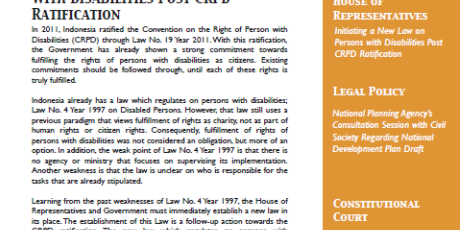House of Representatives
Initiating a New Law on Persons with Disabilities Post CRPD Ratification
In 2011, Indonesia ratified the Convention on the Right of Person with Disabilities (CRPD) through Law No. 19 Year 2011. With this ratification, the Government has already shown a strong commitment towards fulfilling the rights of persons with disabilities as citizens. Existing commitments should be followed through, until each of these rights is truly fulfilled.
Indonesia already has a law which regulates on persons with disabilities; Law No. 4 Year 1997 on Disabled Persons. However, that law still uses a previous paradigm that views fulfillment of rights as charity, not as part of human rights or citizen rights. Consequently, fulfillment of rights of persons with disabilities was not considered an obligation, but more of an option. In addition, the weak point of Law No. 4 Year 1997 is that there is no agency or ministry that focuses on supervising its implementation. Another weakness is that the law is unclear on who is responsible for the tasks that are already stipulated.
Learning from the past weaknesses of Law No. 4 Year 1997, the House of Representatives and Government must immediately establish a new law in its place. The establishment of this Law is a follow-up action towards the CRPD ratification. The new law which regulates on persons with disabilities should already use the same paradigm used in CPRD; viewing the rights of persons with disabilities as human rights, which must be guaranteed by the state, not only as a form of charity. In addition, in accordance with the mandate of CRPD, there must be a particular agency which focuses in supervising CRPD implementations. This agency will oversee and ensure that what is listed in CRPD and more technically set in the new law will run smoothly. Lastly, the new law must clearly regulate on “who does what”. There must be clarity on which agency or ministry will be responsible for a certain task in efforts of fulfilling the rights of persons with disabilities. This is so that tasks and authorities can be mapped out well, and should there be anything that doesn’t go well, it will be easy to find out who should be responsible in order to further run the evaluation mechanism. (FN)
Legal Policy
National Planning Agency’s Consultation Session with Civil Society Regarding National Development Plan Draft
Since February 2014, the National Planning Agency has occupied themselves with collecting inputs from civil society organizations (CSO). The agency is making their rounds across the country from North Sumatra to Papua; meeting regional CSO and asking for their input regarding the National Development Plan draft to be submitted to the presidential election winner in July.
At the moment, results from the inputs are still being formulated in the agency’s draft on the National Development Plan draft. You can view the documents used as tools during their input gathering sessions through these links: http://konsultasi-publik.bappenas.go.id/wp-content/uploads/2014/04/RPJMN-Teknokratik-Tuk-OMS.pdf and http://konsultasi-publik.bappenas.go.id/2014/03/06/buku-kib-1/.
Such initiative from the agency should be appreciated, since CSOs are long known to have their own method in collecting knowledge through their activities. Collected knowledge from CSOs using various methods should complement the technocratic ways policy makers use to formulate our national development program. (GPD)
Constitutional Court
No Limitation of Judicial Reviews to Guarantee Human Rights
Constitutional Court Decision No. 34/PUU-XI/2013 on 6 March 2014 revoked Article 268 paragraph (3) of the Criminal Code, which restricts the filing one-time Judicial Reviews. Some parties consider that there should be a restriction for judicial reviews only once for the sake of legal certainty. Others, however, view that Judicial Reviews should not be limited in order to guarantee human rights to obtain justice.
The Judicial Review is considered an extraordinary appeal that only could be filed if there is new evidence (Novum) while reaching justice and truth. In deciding a case, Justices must consider proportionally the aspects of justice, legal certainty and benefit. Often the aspects of justice and legal certainty attract one another in order to reach substantial justice or procedural fairness.
Weaknesses in the Indonesian legal enforcement, such as cases of false arrest, inconsistent verdicts and so on, often lead to unfair verdicts for defendants. Novum can be found more that once and sometimes not limited by time. If judicial reviews are limited to only once, then there will be no more chance for appeals to be made by the convicted in achieving substantial justice. This, of course, conflicts with Article 28I of the 1945 Constitution, where the rights of life, liberty and obtaining justice are protected fundamental rights.
This Constitutional Court decision deserves attention from the House of Representatives and Government, who are currently revising the Bill on the Criminal Procedure Code. Procedures inherited from colonial times, which limit judicial reviews to only one time, are irrelevant with the context of Indonesia nowadays: Since, the Netherlands itself has already lifted the limitation of one-time judicial reviews in order to guarantee the fulfillment of human rights. (SMR)

